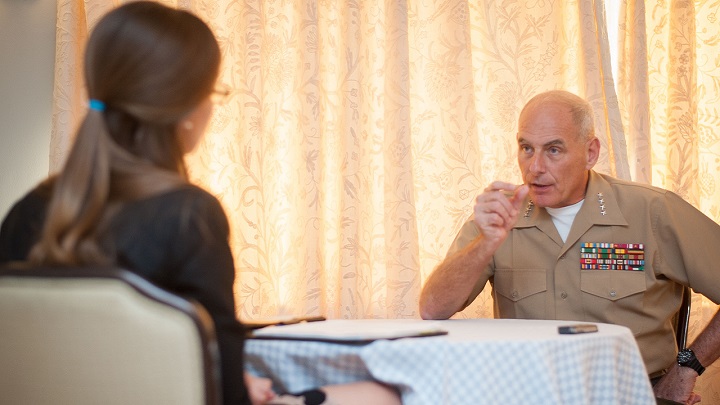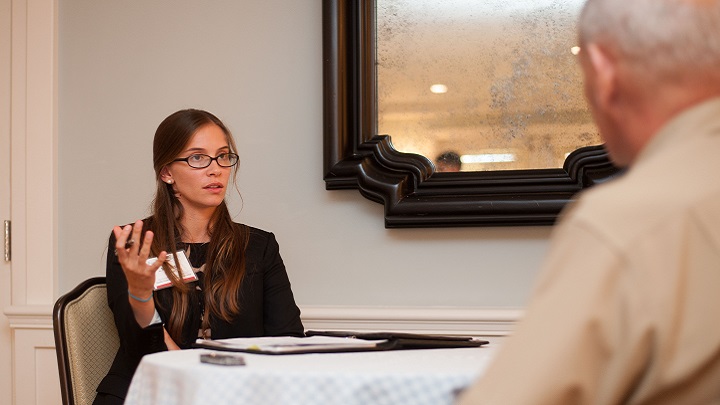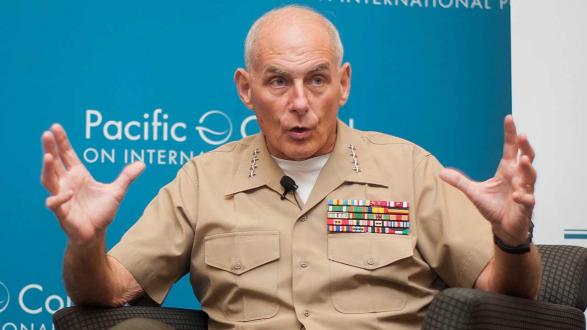In his role as the Commander of U.S. Southern Command, General John F. Kelly oversees all Department of Defense security efforts in the 45 nations and territories of Central and South America and the Caribbean, an area of 16 million square miles. General Kelly has served over forty years with the United States Marine Corps, and served with distinction in the Persian Gulf War during Operation Desert Storm and the Iraq War.
At Members Weekend 2015, Melissa Lockhart Fortner, the Pacific Council’s Vice President of Communications, sat down with General Kelly to discuss SOUTHCOM’s major mission objectives and priorities in the region.
The following has been edited and condensed for clarity and length.
____________________
Melissa Lockhart Fortner: In your opinion, what is the most pressing global issue that isn’t receiving enough attention?
General Kelly: If we say “is not receiving enough attention,” we can take China, Russia, and terrorism off the table. I think what’s left that is a huge threat is transnational criminal organizations and transnational crime. That’s the most important issue: from drugs to human trafficking to illegal coal mining to sex slaves. It’s worldwide.
It has not yet made the linkage with international terrorism yet, but it’s close. We’re actually starting to see a few places where they may be facilitating each other a little bit. We know that huge amounts of money – we don’t know how much – are being taken from transnational criminal endeavors and funneled into international terrorism. The irony is, in some respects, a percentage of international terrorism is funded by the American cocaine trade, or by the trade in young females into Western countries for sex. But we are just starting to see those two worlds touch: there is not a nexus yet.
So the answer to your question is, first, transnational organized crime and then, as a subset of that, corruption.
ML: In your work in the hemisphere – a huge area of responsibility – the transnational crime network must be a top priority.
Gen. Kelly: Huge.
ML: And in what countries do you focus your efforts?
Gen. Kelly: Every single country that’s willing to work with us. Across the region in the Caribbean, Central America, and South America, most countries are very open to interacting with the United States. We have very good relationships. Some not so much: Cuba is one that clearly has its own dynamic, but even that country is open now to a degree. The relationship there will increase at the rate at which the Cubans want to increase it.
But with the exception of countries like Venezuela, Ecuador, Nicaragua, and Bolivia, most countries work with us military-to-military very closely. Law enforcement, DEA, FBI, and Homeland Security are very active, and even more active are the Treasury and Justice Departments. There is a lot of positive activity going on in Latin America to deal with this crime network.
ML: You mentioned Cuba, a country with which the U.S. has restored diplomatic relations. But the military-to-military relationship has been ongoing for some years already.
Gen. Kelly: It depends on how you define it.
ML: There is ongoing collaboration around the Guantánamo base, and there is collaboration in the Caribbean for drug interdiction purposes.

Gen. Kelly: Not necessarily drug interdiction. There are essentially five military services: one of which is the Coast Guard, which is a very different military service with a different mission. The Coast Guard has worked with the Cubans over the years, but mostly in terms of rescue-at-sea and humanitarian activities. But the other four services – Army, Navy, Air Force, and Marines – have had zero relationships with the Cubans.
There is a meeting called the “fence-line meeting” at Guantánamo where the Base Commander, a U.S. Navy Captain, meets about weekly with a counterpart on the other side. They talk and chat a little bit, but it’s not much of a relationship.
Drugs, not so much. There are no drugs in Cuba. One of the great things about having a brutal police state is that the drugs have to go around Cuba. The drugs that go up that particular vector go between Cuba and Haiti, which is 50 to 60 miles across. Our Coast Guard, Navy, and other partner nations are there waiting for them. But not a lot of drugs go up that vector. Maybe 10 percent. All the rest goes up the Central American isthmus in southern Mexico.
ML: In the United States, immigration remains a hot-button issue. The flow of migrants from Central America, particularly unaccompanied minors, featured in the news earlier this year very prominently. These individuals who arrive at the border – via human traffickers – are fleeing violence, poverty, and crime. That must also be a high-level concern for you. What is the SOUTHCOM role in addressing that flow of people and its underlying causes?
Gen. Kelly: The underlying cause is, as you already pointed out, the lack of economic opportunity. The institutions of the countries we are talking about – the court system and the police – are in total collapse. Honduras used to be the most violent country on the planet; now it seems to be El Salvador.
Not every bit of the problem today is a result of our drug demand in the United States, but over the decades and particularly in the last 15 years, the amount of money made available by the drug trade and by U.S. use of drugs is hard to imagine. Cocaine alone brings in something like $85 billion a year in profits. That’s bigger than most countries’ GDPs.
That leaves an unlimited amount of money for bribes. Many of the bribes are simple, something like: “Just turn away, Mr. Minister of Justice in Honduras. Turn away and don’t go after the cartels. Let the drugs flow and we will give you real money. If you don’t, we’ll murder your children and your family and then you.” That’s the discussion they have, and it also applies to judges, to policemen.
I was speaking to a Minister of Interior in one of the three countries we are talking about [Honduras, El Salvador, Guatemala], and he told me that early on he would never take their money. He later gets a CD in the mail, showing his two daughters leaving for school in the morning. The next sequence in the CD is of him and his family going to Mass on Sunday morning. You get the message.
Violence is very high, so investment is hard to come by, and so the economic opportunities are sparse, so people are on the move.
So over time, the court systems have collapsed. The Attorneys General are ineffective. The police are all bribed. The only functioning institutions that exist today are the militaries. In fact, in most of the countries, the militaries are the most trusted and admired institutions. In many cases, they’re the only institutions that the people consider to work.
So today not every bit of the violence is from the drug trade, but maybe 80% is. The decay of national institutions because of the drug trade has become a mess. The violence is very high, so investment is hard to come by, and so the economic opportunities are sparse, so people are on the move. Last year, we had 70,000 unaccompanied minors move to the United States up through Mexico, trafficked very efficiently. Homeland Secretary Jeh Johnson would tell you that an audit to deport any of those children is a four or five year process and a quarter of million dollars, with almost a zero chance they’ll go home. Frankly they’re better off in our country. I’m not saying they should stay, but they’re better off here.
ML: Is there a role for SOUTHCOM in addressing the decay of national institutions in Central America?
Gen. Kelly: Yes. My lane is the military lane, so it’s very narrow. But I don’t stay in that lane at all, because I see so many things going on that no one is really addressing. I have very close relationships with these countries: the militaries, civilian leaders, even their presidents. I can call a president and he will take my call faster than he’ll take a call from just about anyone else. I can advise them: I once advised a president to step down. So that’s the first thing: the relationships.
Over the decades and particularly in the last 15 years, the amount of money made available by the drug trade and by U.S. use of drugs is hard to imagine. Cocaine alone brings in something like $85 billion a year in profits.
The second thing we address is their non-traditional and non-military needs. They ask me, “How can I cleanse my police department?” I can get an FBI team down there to help them start that process because I work closely with the Justice Department and the FBI. “How can I de-train my military and give them the kind of training that would allow them to work the streets alongside the police?” I can do that and we do it very frequently. We have – in all of these countries – vetted small units that work with them, that we vet with polygraphs very frequently, and they have proven to be extremely effective in the final stage before drugs and other illicit flows head out of Central America and up through Mexico into the United States.
ML: When you’re working with civilian leaders in the ways you are describing, how do you collaborate with other U.S. institutions? When you’re advising a president to step down, for example, how is the State Department involved?
Gen. Kelly: There are two State Departments in my world. There is the D.C. State Department, where every region of the world has a regional desk. The Western Hemisphere desk is the one we work with and I have a tremendous relationship with them. But I have a different relationship with the individual country teams and the ambassadors. I am very close to virtually all of our country teams. Their system is that the ambassador just focuses on the country he or she is in. The regional focus is done by the regional desk in Washington.
That is counterculture to the U.S. military’s way of doing business. We’re very much decentralized, power-down, and we routinely talk to people on the left and right from other countries. We put together coalitions. When there are massive fires in Chile, the existing system to help Chile with the fires is very bureaucratic. By the time this system works, the fires either burn themselves out or the whole country is burned up. Often times, the ambassador in that case will call me and ask, “How can we make this system work faster?” I can intervene, at least by calling up to D.C. and telling them, “I’m ready to go here. I just need a piece of paper signed.” So it’s a real-world team effort.
We have an annual conference in Miami with all of the ambassadors and chargés from Latin America and the Caribbean. We invite people down from D.C. – the Department of Defense, the State Department. The ambassadors tell me they like that conference more than any other conference during the course of the year because they actually talk about real world issues. And we bring people in and ask them: You’re in Chile, but when was the last time you talked to your U.S. counterpart in Peru about the land dispute issue there? In terms of cocaine production, why isn’t our Ambassador from Peru talking to our Ambassadors in Colombia and Bolivia? They don’t do that naturally. We draw them together.
ML: Washington has a negative historical legacy in the region. As the face of our military in the region today, you play a delicate role in that. Of course, today we’ve made great strides in how we approach countries in the hemisphere as partners, but scars remain, whether we’re talking about the Washington Consensus or propping up Central American dictators, and the War on Drugs has also had negative effect on our relations with our neighbors.

Gen. Kelly: Could you expand on that? What negative effects has the War on Drugs specifically had in our relations in the Hemisphere?
ML: Latin American publics in certain countries, perhaps more so than their governments, have viewed the War on Drugs as a continuation of our historic intervention.
Gen. John Kelly: I would disagree with that. Everything you said up to the War on Drugs, I would agree with.
ML: Okay. Assuming that is part of a more positive legacy then and setting it aside, how do you help to adjust the historic negative legacy?
Gen. John Kelly: That is a great question. About thirty years ago, we stopped doing the interventions, really and truly. Noriega was roughly thirty years ago, along with Panama and Grenada. By the way, I’ve never been, in my life, to a place as thankful as Grenada. Everywhere in Grenada, a man or woman on the street would walk up and say “hey, thank you for what you did.” But that was an intervention.
We have started to change the legacy successfully, because we haven’t done that kind of intervention in 30 years. Everything we have done in the years since then has been very positive in their view. In my life, the number one thing I think about all the time in my interactions with them is human rights. Every discussion we with them begins and ends with human rights. I would tell you that in all of the things we’ve tried to do to change their attitudes on human rights, they’ve all been marginally effective, if at all, except for their shoulder-to-shoulder relationship with the men and women of the U.S. military. They, including the civilians, hold us in such high regard and human rights are all we talk about.
Since 1945, no one in the U.S. military has liked the end result of the military conflicts we’ve been in: Vietnam, Korea, certainly Iraq, and probably Afghanistan. But in a democracy, you salute. You suck it up.
In Guatemala, 200,000 people were murdered, primarily by the Guatemalan security forces. The Guatemalans and I would agree that it’s a different military today and it has been for over 25 years. But you still have to go back and reconcile with the past. Most of the people that could be charged are dead now, but you have to go back and work out some sort of peace commission. Our State Department and others have railed on them about this for years, but real progress has been made in the last few years. And the Commander of SOUTHCOM, whether it’s me or someone else, has such immense influence on this. I’ve called senior officers in countries and said, “You cannot act. I get it: you don’t like the direction the country is headed. But you have to salute even the orders you disagree with.” Since 1945, no one in the U.S. military has liked the end result of the military conflicts we’ve been in: Vietnam, Korea, certainly Iraq, and probably Afghanistan. But in a democracy, you salute. You suck it up. That’s a profound lesson to those men and women. You cannot act. And we’ve seen a number of times when they did not act. You talk about legacy? That is a break from the old legacy, isn’t it?
The Guatemalan president was investigated by the UN. I told him, “You have to keep the UN there, investigating.” He did it, and they investigated and indicted him. Now he is in jail. He was very popular to the military, but now the military is in the barracks. That’s priceless for Latin America.
____________________
Melissa Lockhart Fortner is Vice President of Communications at the Pacific Council on International Policy.




